SAIC Motor sells 7.05m vehicles in 2018
The domestic auto market was hit by negative growth in 2018, the first time in 28 years, with even a double-digit decline in the fourth quarter. Despite operating under such challenging circumstances, SAIC Motor Corporation Limited (SAIC Motor for short), as an industry-leading carmaker, significantly outperformed its rivals by realizing an annual sales volume of over 7.05 million vehicles, up 1.75 percent year-on-year and hitting a record new high in its history, with a market share expected to exceed 24 percent.
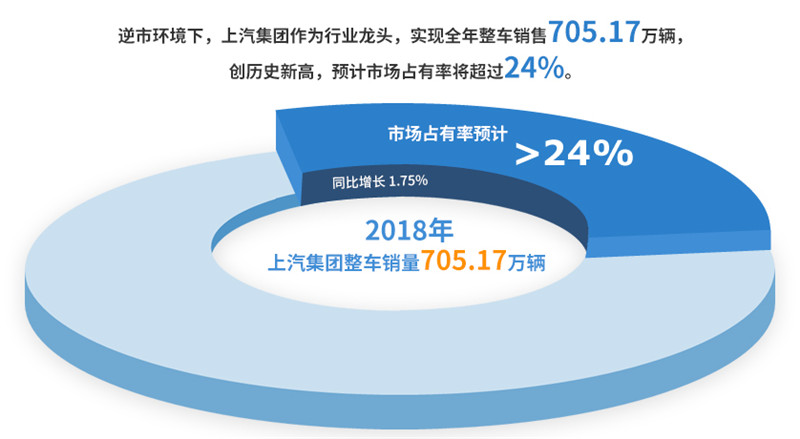
The outstanding performance can be attributed to SAIC Motor’s vigorous efforts in seizing business opportunities, making strong investment, pursuing a differentiated development path and cultivating its competitive advantages, which also constitute powerful engines for the company’s sustainable development in the future. From January to December, 2018, SAIC Motor saw a robust growth in its self-owned brands, with the sales of Roewe and MG in total and Maxus gaining year-on-year increases of 34.45 percent and 14.5 percent, respectively. Notably, great results have been made during the company's pursuit of its new targets: Electrification, Intelligent Connectivity, Sharing and Globalization, with more than 140,000 of its new-energy-vehicles (NEVs) having been sold out in the period, doubling its NEV sales of the previous year for the fifth consecutive year. In addition, SAIC Motor launched its Roewe Marvel X, the world's first mass produced smart car, and tapped the online car-hailing market with its Xiangdao Chuxing mobility service platform. Its vehicle export and overseas sales exceeded 270,000 units, up 62.2 percent year-on-year, with its exports maintaining first place among domestic auto makers.
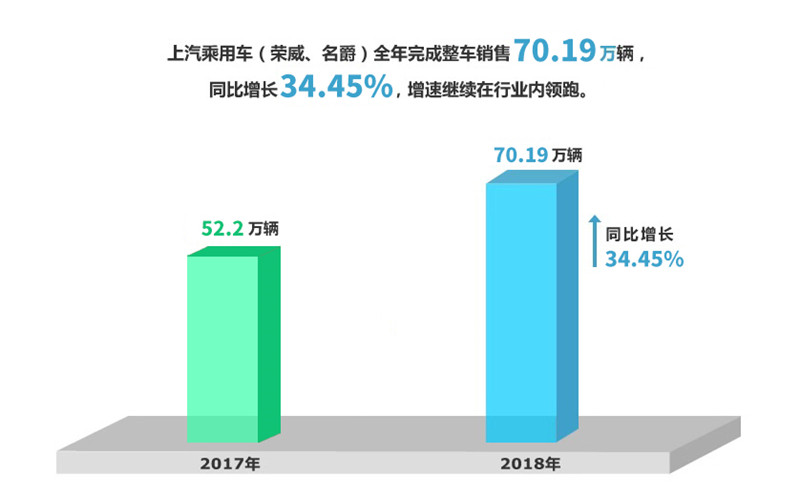
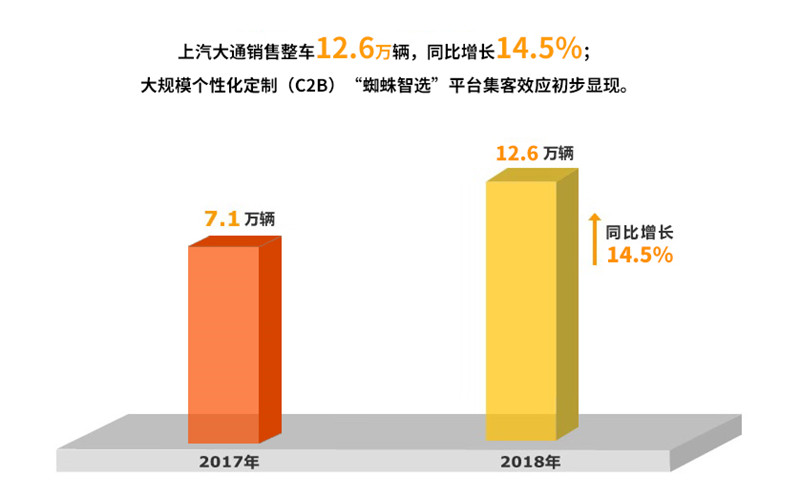
Meanwhile, SAIC Motor continued to accelerate its crossover cooperation by establishing alliances with other companies to promote its future development. Following the collaboration with Alibaba Group to produce an internet-connected vehicle, SAIC Motor signed agreements with China Mobile, Huawei, Mobileye and the Traffic Management Research Institute of the Ministry of Public Security to jointly conduct R&D and system construction of key technologies in intelligent-connectivity. It also cooperated with the Aluminum Corporation of China and launched a joint lab for developing the lightweight technology. In addition, the company implemented many innovative measures to reform its financing and incentive mechanisms.
Self-owned brands and joint ventures
The self-owned brands of SAIC Motor maintained strong growth in 2018 despite the sluggish market, with its Roewe and MG models realizing a sales volume of 701,900 units, an industry-leading increase of 34.45 percent year-on-year. Among them, the Roewe RX5 topped 200,000 units in sales, the new brand MG6 saw steady improvement in its popularity and sales, and the MG ZS was increasingly welcomed worldwide, with 23,000 of its 100,000 units sold in the year belonging to an overseas buyer. SAIC Maxus, another self-owned brand of the company, hit 126,000 units in sales, up 14.5 percent from a year earlier. Its Customer to Business (C2B) mass customization platform Zhizhu Zhixuan is also gaining popularity, with the help of which the Maxus recreational vehicles (RVs) realized annual sales of over 1,000 units. The "Fangche Shenghuojia" app, a one-stop service platform developed by SAIC Maxus for RV users, received 2 million downloads, ranking first among RV apps worldwide in this respect.
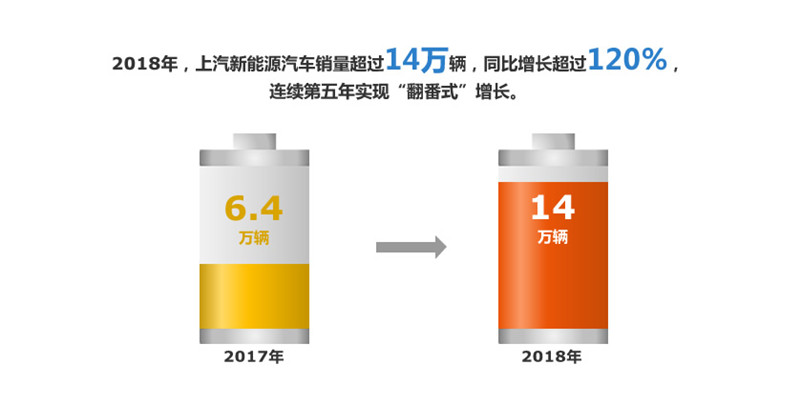
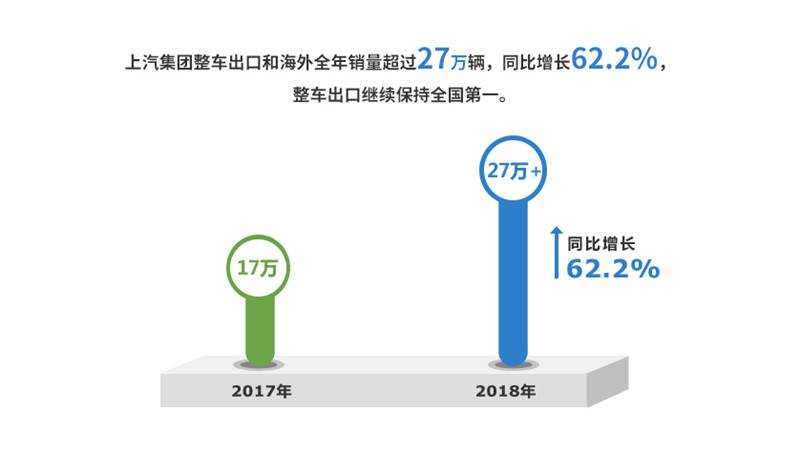
The joint ventures of SAIC Motor maintained steady growth. SAIC Volkswagen, SAIC-GM and SAIC-GM-Wuling are among the top four domestic vehicle makers in sales. In particular, SAIC Volkswagen ranked first and reigned over other domestic passenger vehicle makers for the fourth consecutive year. Meanwhile, these joint ventures kept up with market trends and expanded their business to cover high-end vehicles and NEVs. The joint venture project between SAIC Motor and Audi saw the completion of legal approval procedures concerning Audi taking a stake in SAIC Motor. The MEB plant of SAIC Volkswagen for NEVs commenced construction, which will produce NEVs of the Audi and Volkswagen brands upon completion. The SAIC-GM Cadillac brand maintained a strong performance amid fierce competition among luxury vehicles, with annual sales in 2018 reaching 228,000 units, a year-on-year growth of 31.8 percent. SAIC-GM-Wuling brands, including Baojun 510 and 310, and Wuling Hongguang remained among the best sold auto brands in their respective market segments.
New-energy-vehicles and related core technologies
SAIC Motor sold more than 140,000 of its NEVs in 2018, up 120 percent year-on-year and doubling its NEV sales of the previous year for the fifth consecutive year. It has become one of the top three domestic carmakers in NEV sales, and is striving to seize the first position. Among its NEVs sold in the year, the company’s self-owned brands Roewe and MG took up 96,000 units, doubling their sales of the previous year. Its plug-in electric hybrid Roewe eRX5 and ei6, as well as the pure electric Ei5, has become popular NEV brands, enhancing the reputation of SAIC Motor in the medium-to-high-end NEV market. SAIC Maxus FCV80, a fuel cell light passenger vehicle, has been put into commercial operations in three domestic cities, with a fleet size of more than 300 vehicles.
The robust growth is a result of the company’s fast improvement of NEV core technologies. SAIC Motor is the only auto maker in China that sticks to the synchronous development of electric vehicles, plug-in electric hybrid vehicles and fuel cell vehicles. With its core technologies related to the electric drive system, battery, and electric control system of NEV, it has launched more than 20 NEVs to date. In January 2018, the company was awarded the 2nd prize in the year’s State Science and Technology Progress Award, for its project of Key Technologies and the Industrialization of Low-Power Plug-in Hybrid Electric Passenger Vehicles, which was the only auto project that won the prize that year.
Currently, the company is pushing forward the second round of innovations in NEV core technologies related with the electric drive system, battery, and the electric control system, and has been advancing the development of a new NEV design, to strengthen its technological advantages in the NEV market. In the meantime, the company’s joint ventures concerning NEV development have been gaining momentum with the successful launch of its Tiguan and Passat plug-in electric hybrid vehicles, hybrid Buick VELITE 5, and pure electric Baojun E200, plus the construction of the MEB plant of SAIC Volkswagen for NEVs.
Mobility services
SAIC Motor has been improving its service structure by establishing a mobility service platform to facilitate people’s mobility, car purchasing and the vehicle logistics. It has recently built an artificial intelligence lab, the first of its kind in the auto industry, to facilitate its innovations in mobility services.
At the end of last year, SAIC Motor launched its mobility service brand “Xiangdao Chuxing”, which is now in operation with a fleet size of 1,400 vehicles, and is equipped with qualified drivers. By providing safe and quality services, it has been met with a positive response in the auto market, with user satisfaction reaching as high as 99 percent. Its Global Car Sharing and Rental Co has become the world’s largest company specializing in NEV car sharing and rental businesses, operating 45,000 licensed cars in 64 cities across the country, with more than 4 million members and handling over 90,000 orders per day.
SAIC Motor also launched Chexiang, an O2O (Online To Offline) e-commerce platform providing both online and offline one-stop services for customers from their selection, purchasing, using to the selling of a car, which is the first of its kind in the domestic auto market. In addition, the platform also expanded its business to high value-added services such as the C2B mass customization. In 2018, more than 80,000 vehicles were sold via Chexiang, making it one of the best e-commerce platforms of its kind in sales. Chexiangjia, an offline auto service provider owned by Chexiang, has over 2,300 stores in China, with more than 3 million members. It has been working on expanding its service scope by selling auto parts, second-hand vehicles and insurance.
Moreover, SAIC Motor has been stepping up the construction of its freight platform to optimize the traditional vehicle logistics. Its Anji Logistics, the world’s largest vehicle logistics service provider, has been vigorously innovating its business models by developing intermodal transport and intelligent warehouses. In express services, SAIC Motor has entered the non-vehicle logistics field with its acquisition of Tiandi Huayu, one of China’s top logistics companies, and started to develop a society-oriented urban express logistics platform.
Overseas sales
SAIC Motor witnessed an explosive growth in its vehicle export and overseas sales in 2018, with the annual overseas volume exceeding 270,000 units, up 62.2 percent year-on-year. Its vehicle exports ranked first nationwide for the third consecutive year. In recent years, the company has been upholding a global perspective and conducting multinational businesses. It has set up three overseas vehicle manufacturing bases in Thailand, Indonesia and India, respectively, 11 marketing service centers in places such as Europe, North America, South America, Africa, Middle East, Australia and New Zealand, as well as nearly 500 marketing service outlets overseas. Its vehicles reached a sales volume of over 10,000 units in six overseas countries, namely, Thailand, Britain, Indonesia, Chile, Australia and New Zealand.
Notably, in the company's major overseas markets, MG, Maxus and Wuling have become the mainstream auto brands. SAIC MG ZS, an internet-based vehicle, has been quite popular among local young consumers since it was launched in Thailand, and has ranked among the top auto brands in the local market. The car is the first internet-based vehicle that the company has launched overseas. SAIC Maxus also enjoyed an outstanding performance in Australia and New Zealand, with its sales maintaining first place among other Chinese auto brands in the Australian market for two consecutive years. In addition, two new Wuling models ranked second and eighth in the Indonesian market.
Currently, the SAIC base in Thailand has been working vigorously to promote the upgrading of the local Internet of Vehicles and the construction of the country's vehicle ecosystem, as well as the future launch of new-energy-vehicles. The SAIC base in India will introduce new internet-based cars in 2019.
Technological innovation
Technological innovation is a core strategy of SAIC Motor in achieving business excellence and a strong driving force for its future sustainable development.
In constructing the whole industrial chain of NEV, SIAPM, a joint venture between SAIC Motor and Infineon, a Germany-based semiconductor manufacturer, has delivered its mass produced IGBT (Insulated Gate Bipolar Transistor), a high-tech semiconductor switch that is a core element of NEV and the high-speed train. SAIC Motor has set up the Jieqing Technology fuel cell manufacturing company to accelerate the commercialization of its fuel cells. It trial-produced Type 300 fuel cell stack has achieved a globally leading power. In developing the key intelligent connection technologies, the company has equipped its Marvel X model with the function of self-parking, which will be launched this year. Zhong Hai Ting, a high-precision map producer which SAIC Motor has a stake in, has obtained the Grade A qualification in surveying and mapping the national navigation electronic map. SAIC Motor has obtained the first license in China to conduct open-road tests of vehicles and is also one of the first auto makers in Jiangsu province to have obtained a license for conducting road tests of self-driving cars, with the distance in car testing topping 8,000 kilometers, amounting to three round trips of a car on the Beijing-Shanghai Expressway. In building the "central platform" of the company, a strategy initiated by Alibaba for establishing a central functional department to support its front-end services, SAIC Motor took the initiative in the auto industry to apply the strategy to drive the digital transformation of its businesses. In recent years, more and more internet companies have been implementing the strategy to support their front-end services. Currently SAIC Motor has been accelerating its "central platform" construction in data, business and technology fields by applying such emerging technologies as the artificial intelligence, big data and cloud computing, to provide modularized and general support for front-end products and services. It has piloted the strategy in its Xiangdao Chuxing online car-hailing and C2B mass customization services to drive the innovative development of its businesses.
Financial services
Faced with the deleveraging of the financial market and the decline of the auto industry, SAIC Motor has strengthened the financial services to support the development of its whole industrial chain. SAIC Volkswagen and SAIC-GM have expanded their financial business scope to the highest level in their histories, providing strong financial support for SAIC vehicles including the company's self-owned brands. Its online financial service platforms such as "Haoche Yidai" and "Shensudai" maintained a rapid growth. Its insurance services have covered over 3 million vehicles. In terms of equity investment, four of the companies that SAIC Capital, an investment company owned by SAIC Motor, has a stake in, were listed last year. SAIC Capital has seen the assets under its management exceeding 32 billion yuan ($4.73 billion). As for the financial leasing business, the SAIC GMF, a financial leasing service provider, has been established to promote the company's vehicle sales.
Against the declining auto industry, SAIC Motor will firmly pursue its new targets: Electrification, Intelligent Connectivity, Sharing and Globalization, by sticking to technology-driven development and a forward-looking perspective, accelerate its transformation and upgrading, and form differentiated competitive advantages to ensure steady and sound operations as well as high-quality business development.

